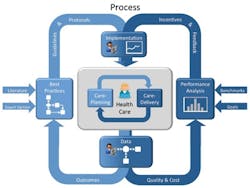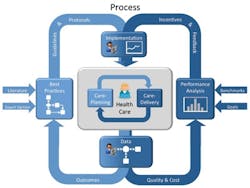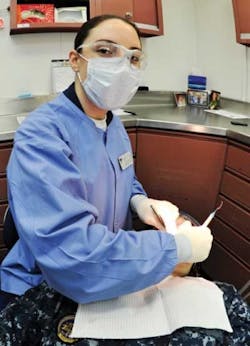Aboard the Truman
Dental hygienist is a one-woman show on aircraft carrier
by Mass Communications Specialist 2nd Class (SW) David Wyscaver, USS Harry S. Truman (CVN 75) Public Affairs
Each and every day service members in the U.S. military across the globe make extraordinary sacrifices to ensure their fellow Americans can enjoy the freedoms outlined by our founding fathers. While every branch of service is unique, each plays a vital role in defending freedom and democracy around the world. In order to successfully accomplish any mission, every military member must first make sure they are in "tip-top" condition both mentally and physically.
Navy Hospital Corpsmen, known within the Navy as HMs, are the enlisted personnel responsible for all medical, dental, and overall health care needs of sailors. HMs in the Navy may share the same title, but because of their individual training, previous work experiences, qualifications, and expertise, no two are the same.
One unique sailor, Hospital Corpsman 3rd Class Jodie Stump, stationed on board the aircraft carrier USS Harry S. Truman (CVN 75), brings a versatile set of skills, a dynamic background in the dental field, and an amazing drive to perform her duty as the only dental hygienist on board the warship.
"HM3 is our only licensed dental hygienist on board," said Cmdr. Jorge Graziani, head of Truman's dental department. "Treating the 5,000 plus crew members is a tough job. Her outstanding professionalism, high work ethic, organizational skills, and willingness to go above and beyond make her a great sailor."
Before joining the Navy in December 2008, Stump attended college at Indiana University Purdue University Fort Wayne (IPFW) for three years, where she completed an associate's degree in dental hygiene and acquired her civilian dental hygienist license.
"Most hygiene programs are associate degrees," said Stump. "In order to become licensed, I had to complete the schooling with all the necessary prerequisites. I had to take a law class on malpractice, and a cumulative test covering the entire two years in hygiene administered by the National Board. I also took a clinical board, which is a hands-on test with a patient, in order to demonstrate the necessary dental hygienist practices. Each state licensing requirement is different; currently I'm licensed in Indiana and Colorado."
After earning her license, Stump practiced dental hygiene at various civilian offices in the Fort Wayne area by subbing for full-time hygienists. As openings for a desirable full-time position decreased, she weighed her options.
"My dad mentioned the military to me," said Stump. "I discovered I could do something I love, travel, and serve my country all at the same time."
Stump chooses the Navy
After deciding to join the Navy as an active duty service member, Stump spent one year in the Delayed Entry Program (DEP) until a slot opened as Hospital Corpsman.
After successfully completing boot camp in Great Lakes, Ill., each sailor is required to attend a technical apprenticeship school to learn duties of his or her individual rating. As an HM, Jodie attended the Hospital Corpsman School for three months in Great Lakes. There she learned basic medical procedures such as giving IV's, first aid procedures, CPR, and other essential corpsman duties. She then attended the military dental technician school for six weeks, where she received additional specialized training.
"Very few corpsmen possess this rare qualification," said Stump. "My civilian training, degree, and dental hygienist background helped me be accepted into the military hygienist program. I'm so happy to do a job I enjoy so much every day. I assist others to ensure they are able to carry out the responsibilities of their jobs throughout the ship."
Prior to attaching to her first duty station, Jodie was unsure of what to expect and the importance of her role on board. "I had to overcome many obstacles," she explained. "Not only was I filling the billet of someone that typically has more years of experience than me, I had to adjust to all the different responsibilities and collateral duties of being a sailor in the Navy. It definitely took some time to adjust from being a civilian hygienist to a military one."
While the job and equipment may be similar, there are many differences between the worlds of civilian and military dental hygiene. Work environment, schedule of duties, stress level, patient age, technology, and timeliness are just a few examples that separate these two settings.
During a normal day as a civilian, Jodie typically arrived at work at 7:30 a.m., attended a short office meeting, and treated patients until noon. After an hour lunch break, she then saw patients until 5 p.m., assisted other co-workers, cleaned up, and concluded her day around 5:30 p.m.
Also a sailor
As a military hygienist, not only does she have to ensure her patients are treated and taken care of, she also has to fulfill her duties as a sailor, which can be rigorous and time consuming.
"I see my first patient at 7:30 a.m., and several more until my 11:30 a.m. lunch break," said Stump. "Once lunch is over, I take part in required physical training three days a week, and then go back to treating patients until around 8:45 p.m. with a short dinner break. There is also other training, equipment maintenance, and ship-wide drills and events that I'm required to participate in."
Many of these duties would consume an ordinary individual's daily schedule, but Stump manages her time wisely and ensures that she stays on top of each task.
"She's very responsible and that shows through her work," said Lt. Amy Respondek, one of five dental officers on board. "I coordinate with her daily on patient treatment, planning, exams, and other dental aspects. She's very thorough in her job duties and puts an emphasis on attention to detail. Her primary job as a hygienist demands a high workload."
In the military, all service members are required to receive an annual dental exam to ensure they are up to standards on all dental-related issues and to receive the necessary care if needed.
"I'm solely responsible for treating the dental hygiene of the 5,000-plus crew members and stand on call in case an emergency situation arises," Stump said. "As a civilian, there were three hygienists who together treated a client base of 1,200 patients, and those patients very rarely needed care after working hours."
Based on the condition of his or her dental health, each service member is placed into a Class 1 through 4 rating system, with Class 1 representing the desired score and Class 4 indicating that immediate care is needed.
"In the civilian world, people have the choice whether or not to go to the dentist," said Stump. "That's not the case in the military. Every service member must have at least one exam per year. We strive to sustain a Class 1 readiness level, which means no dental treatment is needed, that everything is up-to-date and satisfactory."
"Military dental care isn't insurance driven," said Respondek. "This allows us to provide whatever type of care is needed without the patient (service member) having to worry about the cost. We put emphasis on patient care first and foremost."
Stump added, "Some patients in the civilian world are limited to what kind of care they can receive because of the type of insurance they have and household income. Certain insurances only cover certain treatment and can lead patients to choose saving money over receiving 'full' treatment."
Other differences between civilian and military dental care can be found in patients' ages and overall stress levels. Military age restrictions dictate what age a service member can begin and conclude service. With the military being such a high-paced, mission-driven organization, stress levels can fluctuate on a moment's notice.
"As a civilian I've treated all ages from infants to senior citizens," Stump said. "But during my time in the Navy, patients are typically ages 18 to 45, which is a good, healthy age range. As for patient stress levels, I've seen a higher level in military personnel due to longer working hours, tougher jobs, and increased responsibility. A lot of personnel are completing high-demand, high-visibility jobs at a very young age, which can be stressful."
While on board Truman, Stump is currently on her first overseas deployment. "I had no idea what to expect," she said. "I stay very busy and I love the people I work with. So far, it's gone by faster than I anticipated, but I really miss my family. Communication is sometimes limited out here, which is much different from the civilian world. It helps me appreciate everyday freedoms a lot more."
Stump's attitude and work ethic continue to draw praise from leaders in the department. "She's the heart and soul of the dental department," said Graziani. "She's the engine that keeps everything going. Nobody has the training and expertise she has, which makes her irreplaceable. We are very fortunate to have dental hygienist Jodie Stump on board."
Past RDH Issues


